B2B marketing has hit a wall. Audiences are getting harder to reach, campaigns are fractured across channels and, for many brands, performance is flatlining. Whatever audiences want, they want it now.
As marketers, we have an obligation to earn our audience's attention. We already know that the B2B journey is powered by content. Channels never mattered to the consumer. Prospects want to self-educate, and content is how they choose to do it.
Increasingly, B2B companies are turning to thought leadership content to enhance brand reputation, build decision-makers' trust, open the conversation, and help close business, according to research by Edelman and LinkedIn.
In fact, 56% of B2B marketing executives stated "positioning our company as a thought leader" as their top objective in a recent Economics Intelligence Unit study.
What exactly is thought leadership marketing? Simply put, it's the art of using content to position your company as a leader in its field. The goal is to demonstrate domain expertise and offer a unique point of view.
If you want your brand to earn respect from your audience, you need to provide value. But what's valuable? The short answer is offering your audience the content they want and need – when and where they're looking for it.
Depending on your industry, demonstrating thought leadership can take different forms. However, if you're looking to increase brand authority in 2020, Quora is a great place to start.
Here, let's explore why Quora makes sense for thought leadership content, how to build brand awareness on the platform, and best practices for advertising on Quora.
Why Quora Makes Sense for Content Distribution
What makes Quora unique is why people come to the platform. It's not search, and it's not social media. It's somewhere in-between, with over 300 million people coming every month to conduct research, evaluate products, ask for tips, and learn more about the world around them.
This knowledge exchange is conducive to people who are receptive to new ideas and looking to discover new products. This includes people looking for reliable information about your company, products, competitors, or industry as a whole.
Aside from a growing high-intent audience, Quora works to build a platform and ecosystem that is optimal for readers, writers, askers, and seekers of information. Unlike other platforms where content gets buried or disappears, the knowledge shared on Quora is evergreen. This means your answers aren't just relevant for a day — they're still easy to find months and years later.
Additionally, people aren't one dimensional. We have multiple interests. Quora personalizes the content based on what people want to learn more about so it's always relevant.
For instance, I'm learning how to surf, so I follow Surfing to understand the terminology and etiquette. I also have one-year-old at home, so Parenting helps me be a better father. Digital Marketing keeps me updated on the latest trends in our industry. And Personal Finance provides expert advice on how I can prepare for retirement and practical ways to start investing.
Plus, it's a lot of fun reading analysis and opinions of the latest Star Wars: Rise of Skywalker movie, so I can keep up with what my nerd of a wife is waxing eloquent about.
Now that we've explored why Quora is a powerful channel for brand awareness and distributing content, let's explore who you'll find on Quora and how to know which audience(s) to target.
How to Find Your Audience on Quora
Quora has a greater concentration of P18+ users with a HHI > $100K than other publishers such as WSJ, LinkedIn, HuffPost, and Reddit.
Additionally, Quora users are highly educated, with 65% having a college degree and 28% having a graduate college degree. In addition, 54% report having a HHI > $100K annually.
Here are a few ways to find your audience on Quora:
- Start searching on Quora. Leverage existing high-performing keywords and topics, and look for question opportunities that offer a solid follower count on topics. This will give you a good idea of potential audience size for a given topic.
- Search your competitors. Are people talking about them? Are they active on the platform writing answers or running ads? If not, then take advantage of this by adopting the platform first. If they are utilizing Quora, you might be missing out on engaging conversions with potential customers.
- Create an ad account. https://www.quora.com/business
- Install the Quora Pixel. Add the pixel on your website and then create a website audience to understand how many of your website visitors are on Quora.
- Create a List Match Audience. Upload your email list in Quora Ads Manager to understand the match rate and overlap. Most Quora users use their personal email address when signing up so business email won't work as well here.
Now that you've identified and targeted your ideal Quora audience, let's dive into how you can create a robust marketing flywheel on the platform.
The Quora Flywheel Effect
The flywheel effect, described by Jim Collins in his book Good to Great, describes a massive, 5,000-pound metal disc mounted horizontally on an axle. He asks the reader to imagine pushing it, so that it turns around that axle. At first, getting it to move at all is extremely difficult. But with each push, it gets fractionally easier and the flywheel begins to pick up speed.
It's a great metaphor for marketing, and Quora is one of the only platforms where marketers can create a robust marketing flywheel.

Here are three best-practices you can employ to create your own momentum on Quora:
- Share: contribute to the conversation by adding and answering questions. This is how you will demonstrate your expertise.
- Engage: interact with high-intent audiences and potential prospects by being an active participant on Quora. Upvoting, commenting, and resharing answers shows that you're interested in being a part of the community.
- Thought leadership: gain authority and establish trust on topics by consistently providing valuable answers and a unique point of view. This leads to more followers and people asking you to answer their questions.
How to Get Started on Quora in 4 Easy Steps
The truth is, thought leadership doesn't have to be costly or difficult. Remember 300+ million people come to Quora every month to learn more about the world around them, which includes your products or services.
According to the 2019 study of B2B content marketing from the Content Marketing Institute and MarketingProfs, 9 in 10 of the "most successful" B2B content marketers prioritize their audience's informational needs over their own sales/promotional messages.
Since the questions on Quora are demand-driven, it's an excellent platform for marketers looking to address the informational needs of their audience.
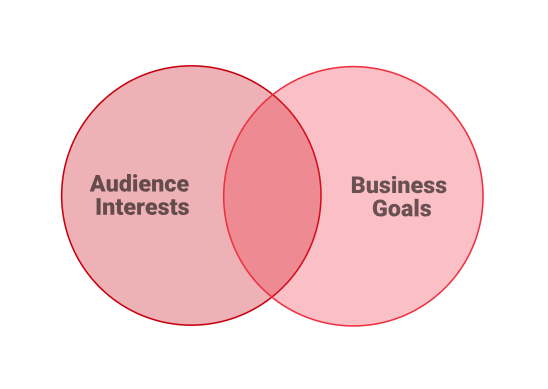
Step 1: Contribute to the Conversation
To turn the flywheel, you must contribute to the conversation. On Quora, that means answering questions. Your answers demonstrate your expertise, give you credibility as a thought leader, and position your voice in conversations about your industry or products.
They are seen by people actively looking for an answer and who are genuinely interested in what you have to say. Plus, your answers can lead to further exposure, since many Quora answers show up in Google searches, or sometimes get picked up by the media, like how Justin Kan's answer got featured in Apple News:

As a writer, your answers are algorithmically matched to people who are interested in the topic. This helps ensure that the right people see what you write — people who are genuinely interested in what you have to say.
These can range between a few thousand to hundreds of thousands or even millions of followers per topic. Because of the way Quora sends out your answer, you have the ability to reach these topic followers right away, before they're even following you as an individual.
How to Map Question Intent to the Buyer's Journey
According to CMI, 90% of top-performing B2B content marketers put audience's informational needs first. This means producing content that directly addresses customer issues and intent.
On Quora it's important to understand the intent of demand-driven questions as it relates to the buyer's journey. Many marketers split the journey into three distinct sections.
- Top of the funnel (TOFO) focuses on brand awareness and site traffic. ToFu content grabs attention. "What is . . ." questions.
- Middle of the funnel (MOFU) focuses on lead generation and nurture. MOFU content educates and informs. "How to . . ." questions.
- Bottom of the funnel (BOFU) focuses on conversion to paid service or product. BOFU content is personalized and product focused. Product review and comparison questions.
Generally, the broader the question, the more views it will receive as it appeals to a larger audience. For example, "What does CRM stand for?" is a general question that has over 100 answers and 40k views.
In contrast, the more specific the question, the lower in the funnel it is thus receiving less views since it appeals to a smaller audience. For example, "What is a good CRM tool for a small e-commerce business, or alternatively, marketing software which includes a CRM function is a very specific question with 20 answers and over 4,600 views.
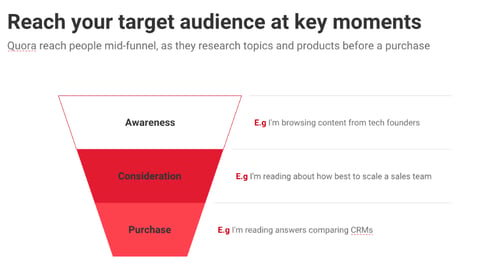
The middle stage of the funnel is the best place to influence and shape the buyer's journey.
Which is why Quora is such an attractive platform for marketers. Since people come to Quora looking for answers and solutions, it only makes sense to have your brand present in order to capture this high-intent audience.
Winning on Quora with High-Quality Answers
Now that you have identified topics and questions related to your business, it's time to answer them. Ask yourself, what makes you an expert or thought leader and why should others care?
To get started, simply answer questions relevant to your industry and expertise. Look for missing information in available answers and provide additional informational value. Authentic and credible answers will grow your following faster which, in turn, will increase answer views.
Jason Lemkin, SaaStr founder and former ceo/co-founder of EchoSign, is a great example of someone who has really invested in the Quora flywheel. He's been a writer on Quora since 2010, and has written over three thousand answers on Quora, gaining 46k followers and over 54M answer views. Jason realizes the value of thought leadership on Quora, which has fueled the growth of his annual SaaS specific conference, SaaStr.
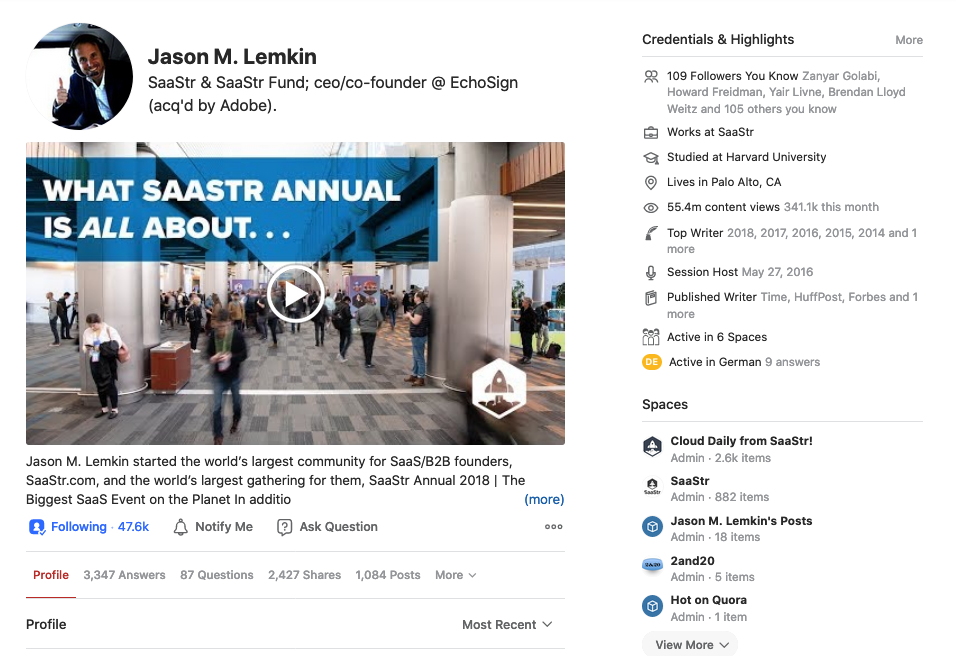
Content marketing on Quora looks a little different compared to a company blog or a social media post. Content on Quora is usually in the form of high-quality answers related to your industry and/or business. But what does high-quality mean?
On Quora, it means answering the question that is asked (don't try to fit your answer into an existing question, if it's not a good fit), being thoughtful and unique, using good formating, and providing your rational and experiences to back up points.
Providing the best answer is key for driving success on Quora. Remember, the primary goal isn't the amount of views, it's providing the best answer to your audience's question.
Here are a few guidelines for what makes good content on Quora:
- Demonstrate credibility, and make sure you're factually correct.
- Structure your answers clearly and ensure they're easy to read (formatting, actionable items, images, etc … ).
- Include unique or interesting facts, personal stories of failures, mishaps, or successes.
- Bonus tip: Answer a question as quickly as possible after it's posted. The question will be fresh in the mind of the person who posted it, and they'll be more likely to upvote your answer or engage you further.
Plus, answers continue to be useful on Quora, even years after they are written. If you write answers that don't "expire," they will continue to be read and useful for future audiences.
Convey Expertise with Your Quora Profile
When you start writing answers, it's important to convey your expertise and build trust by filling out your Quora credentials and bio. Unlike other user-generated Q&A sites, users on Quora create profiles based on their real identities.
Quora has active moderation policies in place to ensure that discourse is civil, content quality is high, and people feel safe sharing their knowledge.
By adding your title, company, bio, interests, and website links, you signal who you are and why readers should trust your answers. It also helps people find you when searching for experts and/or the best people to answer their questions.
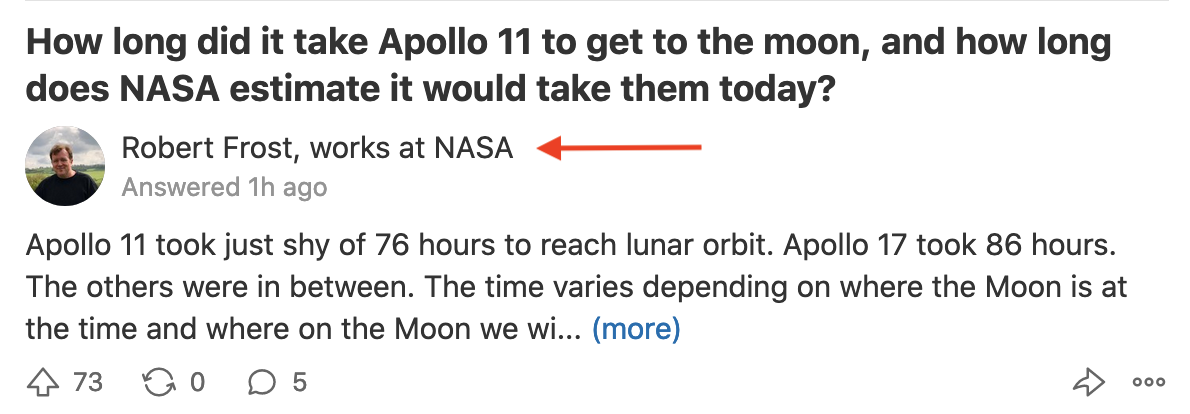
Step 2: Engage with Your Audience on Quora
There's a natural exchange of information that happens on Quora. People answer questions by sharing their knowledge and experiences and users upvote, comment, and share answers they find useful and helpful. Community engagement helps ensure the best answers surface to the top of questions and get more visibility in your home feed.
However, there are some marketers who only use Quora to write self-promotional answers and don't engage with the community. Be better than that.
Engage with the Quora community and your target audience to establish yourself as a trusted member. For example, if someone comments on your answer, give a response rather than letting it go unnoticed. That's what Gabriel Weinberg, CEO and Founder of DuckDuckGo, does in his answers, and the community rewards him for it.
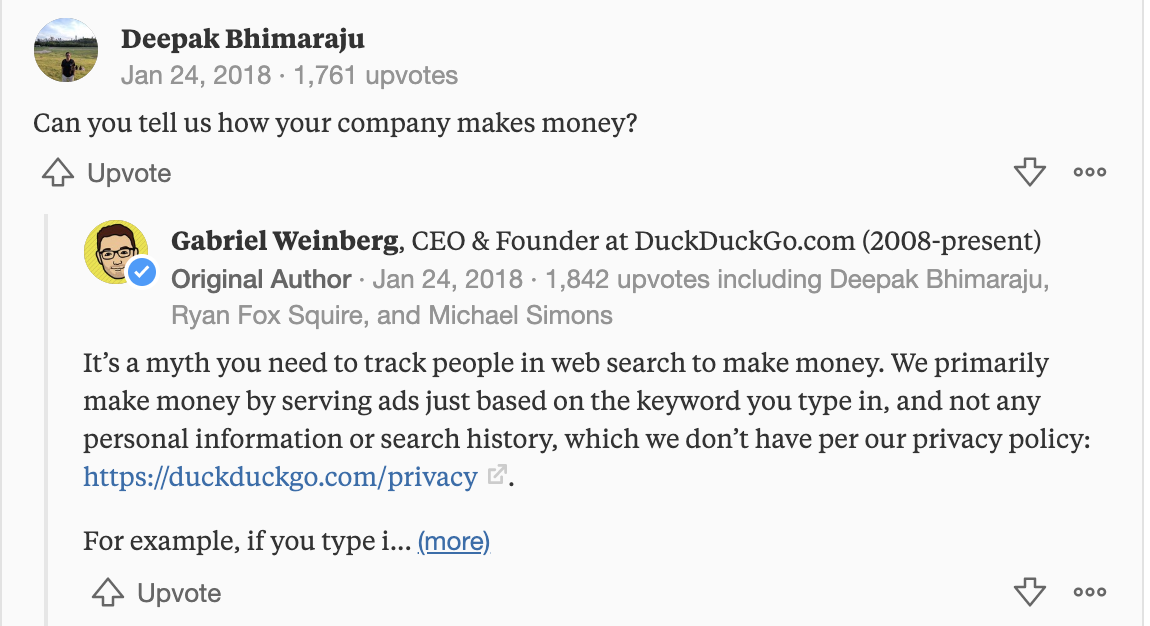
A great way to start engaging on Quora is to follow influencers for topic areas of interests. Our influencers are the 10 writers with the most answer views in the last 30 days called "Most Viewed Writers." For example, if you're interested in Lead Generation then start following the Most Viewed Writers of this topic to get an idea of the types of questions they're answering, how often they write answers, and their writing style.
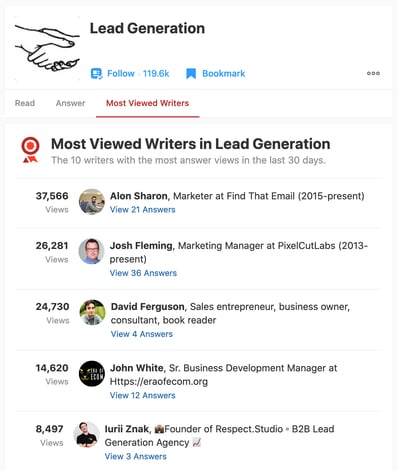
Then, take note of how the community responds by reviewing their engagement, which questions are getting the most views, and where information gaps exist to determine how your answer could provide unique value to a reader. And don't forget to interact with them by upvoting and commenting on their answers.
Another way to engage with the Quora community is by asking questions. By asking questions, you can solicit ideas and experiences from an audience you've selected and quickly gain visibility.
Plus, you can perform market research to gauge audience interest about potential products or services by adding specific questions. If the question isn't on Quora, add it and provide the answer. This is great for questions commonly asked about your company like FAQs.
Be an active participant on Quora, engage with the community, follow other thought leaders and top writers to grow your influence as a trusted member.
Step 3: Gain Authority and Establish Trust with Your Followers
You're doing it. Your flywheel is picking up speed as you consistently answer questions and actively engage with the community.
If you're an expert in productivity tools, don't just write about how much you know. Write answers and provide a point of view tackling specific challenges in the world of team productivity tools. Not only will your audience be more interested in reading an answer that could help them, but you'll earn their trust and gain credibility.
Let's take a look at Asana, a web and mobile application designed to help teams organize, track, and manage their work. They built a presence on Quora through the voice of their co-founder and head of product, Justin Rosenstein. His answer to a 2015 question on top productivity tips has been viewed more than 456,000 times and was featured in Forbes, Inc., Time, and Quartz.
Content Distribution and Amplification
Distribution is often a neglected area of content marketing, but it's crucial to success. Even if you write the greatest piece ever, it doesn't mean much if no one sees it. If you have content you've already written on your blog or website, repurpose it into a helpful answer on Quora.
Get more mileage out of previously written content by sharing it to grow your audience and influence on Quora. Sharing your blog post as a Quora answer rather than a Quora blog post is preferable in most cases, since questions already have a following and are more easily discoverable by search engines.
Consider making Quora your one source of truth for FAQs related to your organization. Ask and answer your list of FAQs on Quora, and link to them from the FAQ page on your website. Or link to Quora answers that serve as testimonials for your business. If there's content on Quora that helps people understand what you do and promotes your business, make sure they find it by linking to it.
If you're looking to increase awareness of your Quora content consider these two ideas:
- Amplify distribution with other social media networks: Share your Quora answers with your existing social media audience. You can do this easily by clicking the Facebook or Twitter icons below the answer.
- Direct your customers to your answers: Share links to your Quora answers with visitors to your website, or email subscribers. It's a great way to help them learn more about a question or topic without having to fit all of the information in a small text field.
Another key factor for consideration when you're evaluating the ROI of writing on Quora is this: Your answers aren't just available through our site. Quora pages consistently rank highly in Google searches, generally on the first page of results, and oftentimes, as the number one result. Quora's strong SEO directs people from Google to your answers so more than just the established Quora community can read it.
Measuring Performance
How do you figure out where to spend your time on Quora? Quora offers a free analytics tool that allows you to track your questions, answers and blog posts by clicks, views, shares, and upvotes. Use this information to determine what works best on the platform so you can focus on sharing content that engages the community.

Step 4: Accelerate Growth with Promoted Answers
The research also revealed that 84% of respondents have used paid distribution channels in the last 12 months (91% among the top performers).
Businesses and individuals often want to reach a larger audience on the platform for their answers. With Promoted Answers, anyone with a Quora Ads account can extend the reach of their answers on Quora.
Promoted Answers have the same targeting capabilities that are available for all other ad formats on Quora, allowing both businesses and individuals to build a following that will be ready to engage with future answers they write.
How Promoted Answers Work
Promoted Answers allow you to share detailed information about your product or service that goes beyond the characters allowed in normal ad copy. They also facilitate engagement through upvotes, comments, and follows.
Promoted Answers are a great way for businesses to join and steer the conversation surrounding your brand.

When it comes to the types of answers that one could promote, businesses can use Promoted Answers to share detailed information about their product or service. Thought leaders can boost their existing content on Quora to bolster their presence and build a following.
Here are some best practices on using Promoted Answers to boost your content:
- Establish thought leadership. Answers a business might promote are positive employee experiences or thought leadership answers by a company founder.
- Write answers that are useful. Provide knowledge that is reusable by anyone who is interested in the question.
- Choose high-quality answers. A good answer is credible, factually correct, and helpful to anyone who wants to know the answer to the question.
- Ensure that the answer isn't too short. Clicks are measured when someone clicks on the preview of the Promoted Answer to read it in full.
Quora Ads enable your organization to:
- Reach a coveted audience. Quora has a worldwide audience of more than 300 million unique visitors. They give advertisers the opportunity to connect during the consideration phase of the buyer's journey, making their ad platform ideally suited to influence future decisions.
- Target for greater efficiency. Reach and influence your target audience through contextual and behavioral targeting options. You can choose to target certain content on Quora or reach people signaling an interest in your product or service.
- Deliver your message in a premium environment. On Quora, your message will only appear alongside content that's on par with your brand. Quora values content quality above all else. Users trust the platform to provide expert answers and surface topics relevant to their interests.
- Measurable results. Quora's ads platform makes it easy to measure the ROI of your campaigns. View standard metrics in ads manager and track conversions using Quora Pixel or integrate with our third party measurement partners.
Lily Rouff, Social Media Strategist at DuckDuckGo, recognized early there were already several conversations happening about their service and competitors on Quora.
As a result, they decided to accelerate the flywheel by promoting answers written by their CEO and founder, Gabriel Weinberg, to augment their presence on the platform in an authentic way.
Rouff told me, "We've been really excited about the [Promoted Answers] CTR. I think it just goes to show how engaged the Quora community is."
"When users are looking for answers already, they're obviously going to be a bit more engaged. We're investing in Quora because our Promoted Answers really seem to resonate with Quora's audience."
By leveraging both community content marketing and paid advertising, DuckDuckGo takes full advantage of Quora's flywheel generating over 1.8 billion views on their answers.
Quora is a unique marketing platform where businesses can share knowledge to build their brand and engage their target audience with industry thought leadership and content marketing. Businesses can also influence high-intent buyers with relevant, highly targeted ads on the platform.
To review, here are three ways to get started on Quora:
1. Build Your Brand
- Get exposure to the more than 300 million monthly visitors to Quora, reaching a large audience from day one, without having to build up a large following.
- Leverage personalized content distribution to millions of users via the Quora Feed and the Quora Digest.
- Content written on Quora is evergreen, delivering leads and driving influence even years after being written.
2. Engage Your Audience
- Personal and Business Profiles can be used to answer questions about your product or service.
- Establish your brand and leaders within your organization as experts by answering questions about your industry or vertical.
3. Influence with Quora Ads
- Use Quora Ads to influence high-intent prospects during the research and consideration phase.
- People come to Quora to research important decisions. Questions on Quora are organized into topics and there is a wide diversity of topics on the platform today.
Ultimately, thought leadership on Quora can be a fun, interesting hobby or personally rewarding, but also is something that every business and leader should be investing time in.
Marketers focused on delivering high-quality, engaging, and inspiring content can positively influence the buyer's journey to purchase.
No comments:
Post a Comment